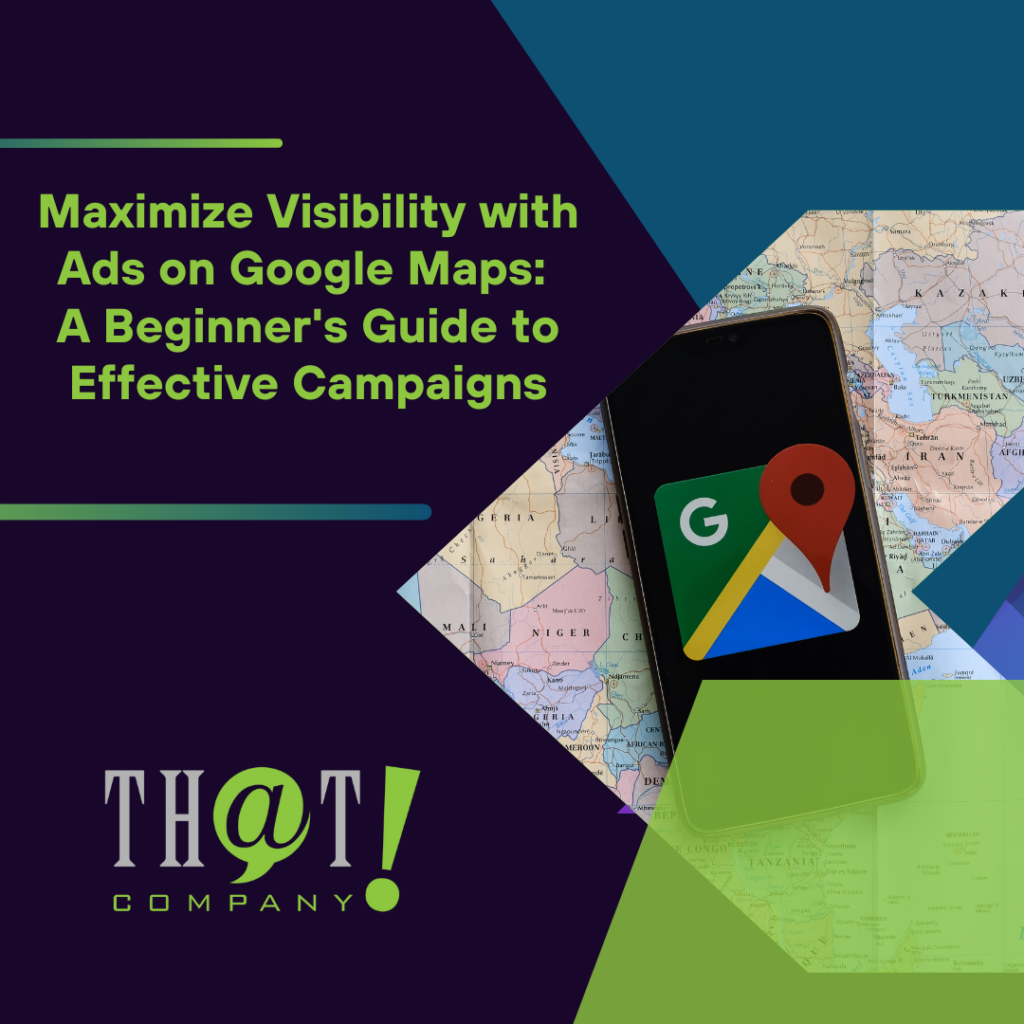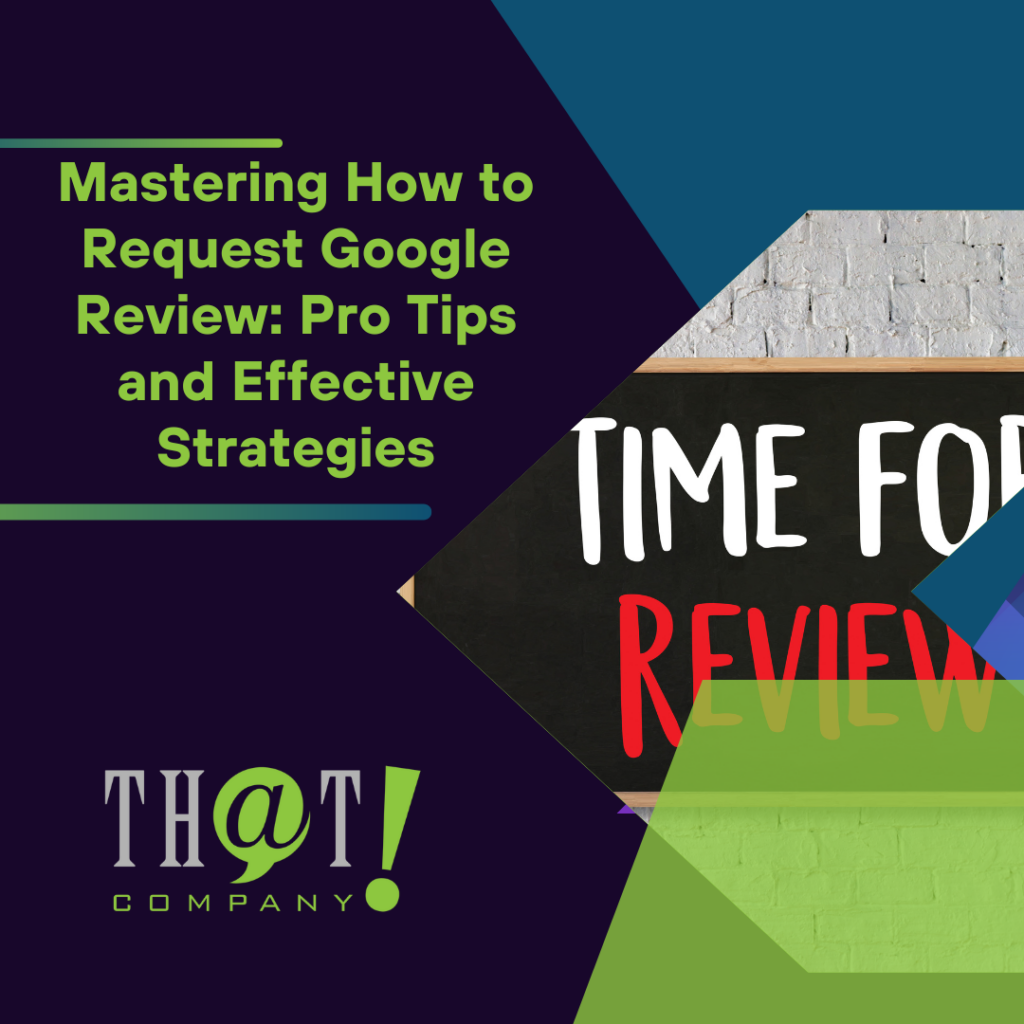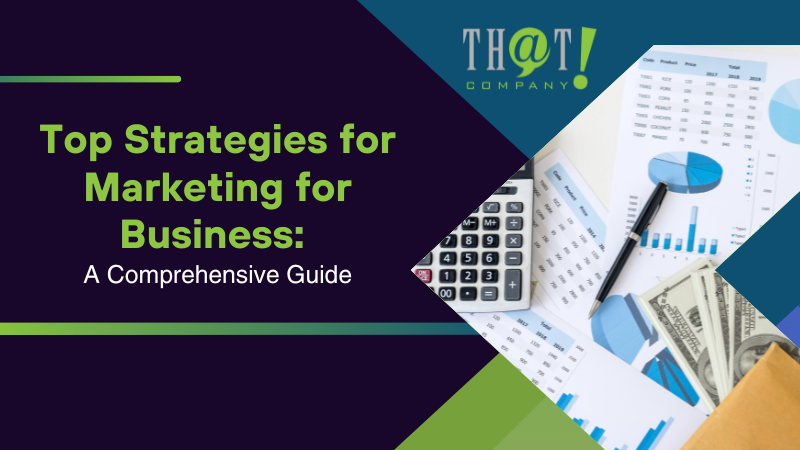
Effective marketing for business is essential to attract new customers and retain existing ones. Whether you’re starting or scaling your business, knowing the right marketing strategies can significantly impact your success. This guide will walk you through key marketing tactics, including digital marketing, social media, and traditional methods, to help your business thrive.
Key Takeaways
- Understand the 4Ps of marketing: Product, Price, Place, and Promotion to build a successful strategy.
- Leverage digital marketing tools like SEO, social media, and email marketing to enhance brand visibility and customer engagement.
- Regularly analyze and measure marketing performance to maximize ROI and adapt strategies for sustained business growth.

The Essence of Marketing for Business
Marketing is more than just a buzzword; it’s a fundamental aspect of any successful business. For small businesses, marketing involves using resources to promote and raise brand awareness. The ultimate goal is to build a pipeline of qualified leads that convert into sales. But how do you achieve this? It all starts with understanding the core principles of marketing, often referred to as the 4Ps: Product, Price, Place, and Promotion. These elements are essential for developing a successful marketing strategy.
A vital part of any marketing strategy is conveying what your business does better than anyone else. This is where your value proposition comes into play. Communicating your unique strengths helps establish your business’s value in the eyes of your customers. Consistency is also key. A consistent brand identity not only makes your business look more professional but also helps attract new customers. Branding sets you apart from competitors by highlighting your unique value.
Effective marketing requires a comprehensive approach that integrates various channels and techniques to reach your target audience. Whether it’s through social media marketing, email campaigns, or content creation, each marketing channel plays a crucial role in building your brand and driving sales. Small business owners can ensure their marketing efforts are efficient and impactful by leveraging these strategies.

Why Effective Marketing is Crucial for Business Growth
Effective marketing is the cornerstone of business growth. It drives brand awareness, attracts new customers, and helps retain existing ones. Imagine your business as a tree; marketing is the water and nutrients that help it grow strong and tall. Without it, even the most promising businesses can wither away. Marketing serves as a foundational element that informs strategic decision-making, helping businesses align their goals and optimize resource allocation.
In today’s competitive landscape, marketing tools are indispensable for small businesses. They help optimize outreach, boost brand awareness, and enhance sales performance. Involving marketing leaders in strategic planning helps organizations grow faster and achieve better overall performance. This integration ensures that marketing efforts are not siloed but are an integral part of the business’s overall strategy.
Moreover, effective marketing helps businesses understand their target market better. Through market research and customer feedback, businesses can tailor their offerings to meet the needs and preferences of their audience. This not only increases sales but also fosters long-term customer relationships. In essence, a well-crafted marketing strategy is crucial for business growth and sustainability.
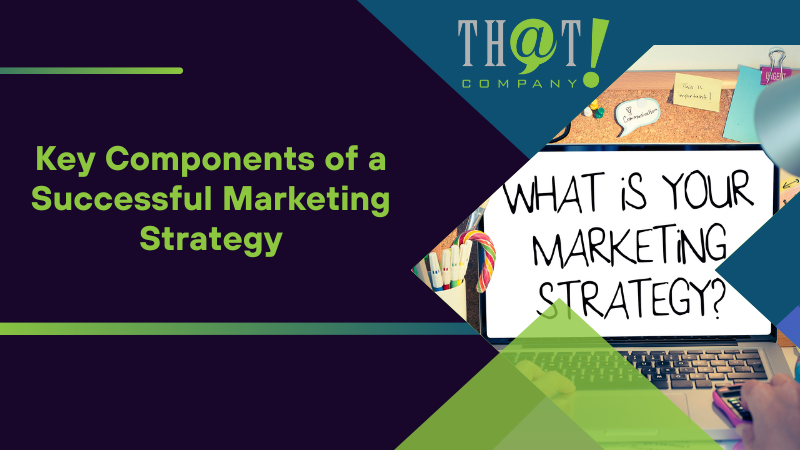
Key Components of a Successful Marketing Strategy
Crafting a successful marketing strategy is like building a house; you need a strong foundation and the right materials. The first step is understanding your customers’ needs, preferences, and behaviors. This involves conducting market research and creating detailed buyer personas that represent your ideal customers. Understanding who your customers are and what they want allows you to tailor your marketing efforts to meet their needs effectively.
Competitor analysis is another critical component. By understanding your market position and identifying growth opportunities, you can differentiate your business from the competition. This involves analyzing both internal and external factors that influence your business.
Setting clear marketing goals is also essential. Goals are broad aspirations, while objectives are specific actions that lead to achieving those goals. An actionable marketing plan outlines the necessary steps, responsibilities, and timelines for execution.
Identifying and defining your target market ensures that your resources are not wasted on a broad audience. Segment your audience based on demographics, geography, psychographics, and behavior to create a more focused marketing approach.
Finally, always measure the success of your marketing strategies. Evaluate what works and what doesn’t, and make adjustments as needed to improve your marketing performance.
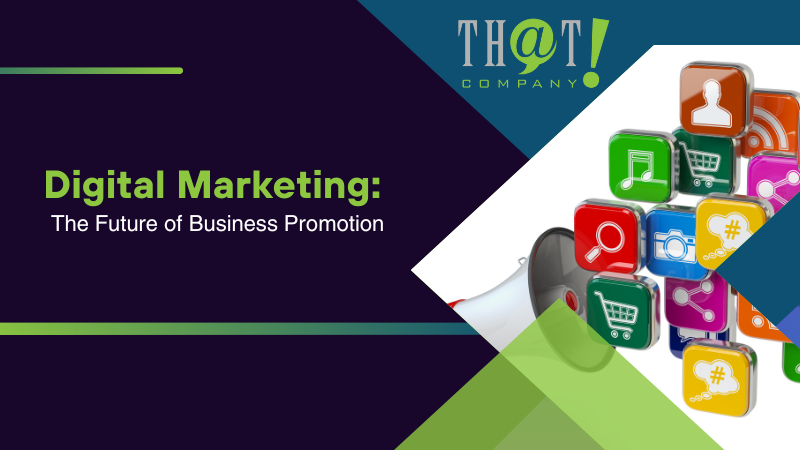
Digital Marketing: The Future of Business Promotion
The digital age has revolutionized the way businesses promote themselves. Digital marketing utilizes advanced technologies and data-driven approaches to enhance brand visibility and differentiate from competitors. It’s no longer enough to have a physical storefront; a strong online presence is essential. Content creation plays a pivotal role in this by establishing trust and demonstrating knowledge to the target audience.
Incorporating a mobile-first approach is crucial, especially since search engines prioritize mobile-friendly websites. This means ensuring your business website is optimized for mobile devices, providing a seamless user experience. That! Company offers scalable digital marketing services that can grow with your business, whether you’re managing a few clients or hundreds.
Digital marketing includes various strategies such as SEO, social media marketing, online marketing, and content marketing. Each of these strategies plays a unique role in promoting your business online. In the following subsections, we’ll delve deeper into these critical components.
Search Engine Optimization (SEO)
Search Engine Optimization (SEO) is both the art and science of enhancing your website’s ranking on search engines such as Google The higher your site ranks, the more visible it becomes to potential customers. Key factors that influence search engine ranking include keywords, content length, content quality, page load speed, and posting frequency. Local SEO is particularly vital for small businesses as over 70% of mobile searches have local intent.
To achieve better SEO, focus on optimizing keywords in website elements, updating your site regularly, creating optimized blog posts, and employing a holistic approach that includes content creation and linking strategies.
Utilizing tools like Google Analytics and Google Search Console can help track your SEO performance and make necessary adjustments. Investing in SEO ensures that small business websites attract a steady stream of organic traffic.
Social Media Marketing
Social media marketing is a powerful tool that engages potential customers, builds brand awareness, and promotes products. Platforms like Facebook, Instagram, and Twitter are not just social networks; they are marketing channels where businesses can directly interact with their audience. Engaging with followers through polls, questions, and consistent posting schedules can significantly enhance user interaction and content quality.
Using multiple social media platforms can be beneficial, but be mindful not to spread too thin. Focus on a few platforms where your target audience is most active. Social media management tools can simplify scheduling and optimizing content distribution across platforms, making it easier to maintain a strong online presence. Creating YouTube videos and short-form video content is highly recommended, as 93% of marketers using video on social media report gaining new customers.
Responding to customer inquiries through comments or direct messages is crucial for building credibility and enhancing customer service. Encourage existing customers to leave reviews and share brand content, as this can amplify your marketing efforts. A social media content calendar can help manage your social media content effectively, ensuring you stay consistent and relevant.
Content Marketing
Content marketing is all about providing relevant and informative content that engages customers. The ultimate goal is to establish authority and retain customer attention. Whether it’s through blog posts, videos, or social media updates, content marketing should focus on addressing customer pain points and providing solutions.
Blogging is a powerful content marketing tool that helps attract prospects to your website by generating organic traffic, establishing credibility, and positioning your business as a thought leader. Adding calls-to-action (CTAs) in your content encourages subscriptions or email sign-ups, helping you engage visitors and convert them into leads.
That! Company crafts high-quality, engaging content tailored to resonate with each client’s target audience. By consistently producing valuable content, businesses can raise brand awareness, drive more traffic to their websites, and ultimately increase sales.
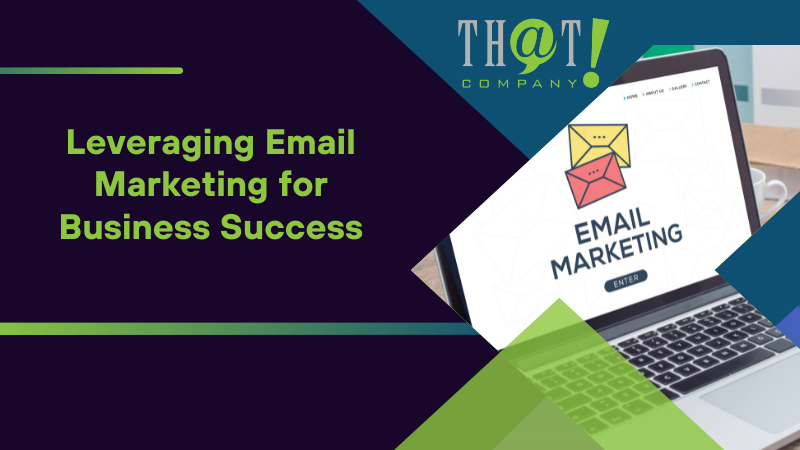
Leveraging Email Marketing for Business Success
Email marketing is a powerful tool for nurturing leads and driving sales through personalized and targeted communication. Unlike other marketing channels, email allows businesses to reach customers directly in their inboxes. Personalization is key; tailored emails that cater to individual customer needs can significantly increase engagement.
Segmenting your email list allows for more targeted messages, ensuring that each group receives content relevant to their interests. Email marketing platforms can facilitate brand promotion and relationship building with customers through streamlined features such as automated campaigns, analytics, and customization options. By leveraging these tools, small businesses can create effective email marketing strategies that drive results.
An effective email marketing strategy involves crafting compelling subject lines, providing valuable content, and including clear calls-to-action. Regularly analyzing email performance metrics such as open rates, click-through rates, and conversions can help refine your approach and improve outcomes. With the right strategies in place, email marketing can be a cost-effective way to boost your business growth.
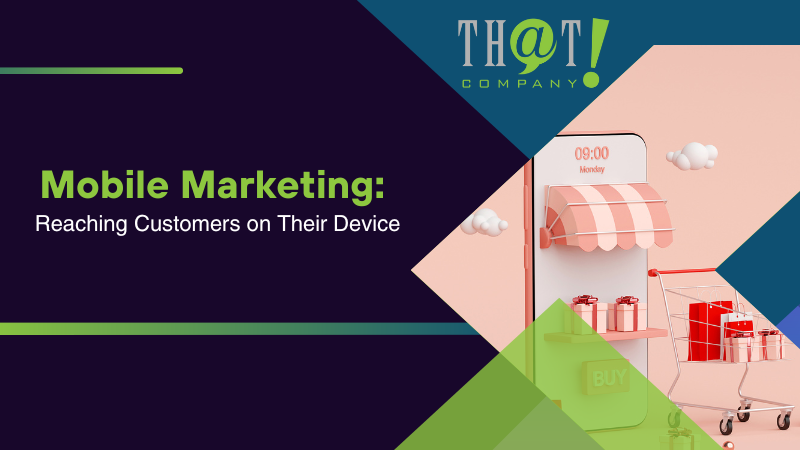
Mobile Marketing: Reaching Customers on Their Devices
In today’s digital age, mobile marketing has become indispensable. With over 60% of global web traffic originating from mobile devices, it’s crucial for businesses to optimize their marketing efforts for mobile users. Mobile commerce is also on the rise, with mobile sales making up nearly 73% of total e-commerce transactions. This trend underscores the importance of reaching customers on their devices.
Emails that are optimized for mobile devices can enhance user experience and increase conversions. AI-driven chatbots are also playing a significant role in mobile marketing by providing immediate assistance and streamlining customer interactions. By investing in mobile-first strategies, businesses can remain competitive and effectively engage their target audience.
Mobile marketing encompasses various tactics, including SMS marketing, mobile-friendly websites, and mobile apps. Each of these tactics provides unique opportunities to connect with customers on the go. Leveraging mobile marketing ensures businesses are accessible to their customers anytime, anywhere.

Traditional Marketing Methods Still Relevant Today
While digital marketing is essential, traditional marketing methods still hold value. In fact, 71% of small business owners find traditional marketing methods essential for connecting with customers. Flyers, for instance, were found to be the most effective traditional marketing method, helping 34% of consumers discover small businesses. Direct mail remains effective, with 29% of consumers finding small businesses through it.
Business cards are another valuable traditional marketing tactic, used by 50% of small businesses in 2023. TV and radio commercials also play a significant role, helping 25% of consumers find small businesses. Events and trade shows are utilized by 32% of small businesses to enhance brand awareness and connect with clients in person, showcasing effective small business marketing strategies.
Traditional marketing methods consist of various forms of advertising. These include:
- magazine ads
- newspaper ads
- billboards
- direct mail
- radio ads
- television ads
These methods can complement digital marketing efforts, providing a well-rounded approach to reaching your target audience. Combining traditional and digital marketing strategies maximizes businesses’ reach and impact.

Tools and Technologies to Enhance Your Marketing Efforts
Incorporating the right tools and technologies can significantly enhance your marketing efforts. Marketing tools and technologies are essential for streamlining and automating marketing strategies, making them invaluable for small businesses. Digital marketing applications can automate promotional tasks while enabling businesses to track their marketing ROI.
Project management tools help streamline marketing workflows by organizing tasks and deadlines effectively. Design software allows businesses to create compelling visuals for marketing campaigns through user-friendly templates and editing features. Tools like Google Analytics and HubSpot Marketing Analytics are crucial for tracking website analytics and understanding customer behavior. Leveraging these tools helps businesses optimize their marketing strategies and improve performance.
Utilizing these technologies enables businesses to work smarter, not harder. They provide valuable insights, automate repetitive tasks, and help manage marketing campaigns more efficiently. This not only saves time and resources but also ensures that marketing efforts are more targeted and effective.

Key Benefits of Utilizing That! Company’s White Label Digital Marketing Services
White label digital marketing services provide businesses with the tools to economically reach a wider audience compared to traditional methods. That! Company offers a comprehensive suite of white label digital marketing services, including search engine optimization, pay-per-click advertising, social media marketing, and content creation. These services are designed to help small businesses maximize their marketing efforts and stretch their marketing dollars further.
One of the primary benefits of leveraging That! Company’s white label services is the ability to track and optimize campaigns in real-time. This empowers businesses to make data-driven decisions and adjust their strategies to improve performance. Moreover, digital channels enhance customer interactions, offering businesses insights into their audience and opportunities for hyper-personalization. This ensures that the right message reaches the right audience at the right time.
That! Company’s white label digital marketing services also facilitate improved customer service through social media platforms, allowing businesses to communicate effectively with customers throughout their buying journey

Crafting a Long-Term Marketing Plan
Creating a long-term marketing plan is essential for sustained business growth. The first step is to define your marketing goals clearly, ensuring they align with your business objectives. These goals should be specific and measurable, encompassing both short-term and long-term objectives. Long-term goals might include brand awareness and customer relationship building, which may not yield immediate returns but are crucial for long-term success.
A marketing strategy is an ongoing process that requires regular evaluation and adjustment. Evaluate your marketing efforts by looking at costs versus outcomes to determine ROI. Identify what elements of your current marketing efforts are working and what are not, and make adjustments accordingly.
Analyzing data and experimenting with different marketing options provides insights into what is most effective for your business. Rank your marketing strategies by success to identify the top performers and focus your resources there. Pay attention to analytics and adjust your marketing strategies as needed to continually improve your results.
By crafting a well-thought-out long-term marketing plan, businesses can ensure their marketing efforts are strategic, efficient, and effective.

Measuring and Analyzing Marketing Performance
To ensure your marketing efforts are yielding the desired results, it’s crucial to measure and analyze performance. Utilizing analytics can refine marketing strategies and improve targeting. Real-time data from digital marketing campaigns allows for targeted adjustments, improving the effectiveness of your efforts. Tools like Google Analytics are invaluable for tracking website traffic and understanding visitor behavior.
Measuring marketing efforts is necessary to ensure return on investment (ROI) and track progress towards goals. By understanding which strategies are most effective, businesses can allocate their marketing budget more efficiently and maximize their ROI. Regularly reviewing performance data helps identify trends, opportunities, and areas for improvement.
That! Company leverages in-depth analytics and performance data to continuously refine and optimize white label digital marketing campaigns. This approach ensures that marketing strategies are always aligned with business goals and are delivering the best possible results. Measuring and analyzing marketing performance helps businesses stay ahead of the competition and achieve sustained growth.

Building Strong Customer Relationships
Building strong customer relationships is crucial for long-term business success. Establishing emotional ties with customers can lead to increased spending, as emotionally connected customers are more likely to invest in the brand. Companies focusing on relationship marketing typically see a higher return on investment compared to those relying solely on transactional strategies.
Successful relationship marketing emphasizes long-term connections over one-time sales, allowing businesses to cultivate loyal customer bases. Building trust through consistent brand behavior and transparency can enhance the emotional connection between the business and its customers.
Creating a sense of community around a brand can also enhance customer loyalty, as engaged customers often promote the brand to others. Regularly seeking customer feedback and acting on it can foster a partnership feel, strengthening the relationship with the customer.
Offering exclusive benefits to loyal customers can help nurture relationships by creating a feeling of belonging and appreciation. Compelling marketing messages and strategic outreach are key in building awareness, generating leads, and nurturing long-term customer relationships.

Maximizing ROI on Your Marketing Budget
Maximizing ROI on your marketing budget is essential for small businesses with limited resources. Email marketing is one of the most cost-effective strategies, often generating a high return on investment, cited as $42 for every dollar spent. This makes email marketing accessible for small businesses looking to make the most of their marketing dollars.
To enhance your marketing budget’s efficiency, establish baselines that track your typical lead generation over time. This helps you understand what works and allows you to focus on the lowest total cost strategy for your marketing campaigns. Your marketing strategy should reflect your unique business identity, leveraging your strengths as a small business to stand out in the market.
Focusing on cost-effective strategies and continuously analyzing performance ensures the marketing budget is used efficiently and effectively. This approach not only maximizes ROI but also supports sustained business growth.

Summary
In conclusion, effective marketing is crucial for business growth, especially for small businesses looking to make the most of their marketing budget. By understanding the essence of marketing, crafting a comprehensive strategy, and leveraging both digital and traditional methods, businesses can raise brand awareness, attract new customers, and build strong customer relationships.
Digital marketing, including white label SEO marketing, social media marketing, and content marketing, plays a vital role in modern business promotion. Tools and technologies can enhance marketing efforts, making them more efficient and effective. Using services like those provided by That! Company can help businesses optimize their strategies and achieve better results.
Ultimately, a well-crafted long-term marketing plan, regular performance measurement, and a focus on building customer relationships are key to maximizing ROI and achieving sustained business growth. By implementing these strategies, businesses can thrive in today’s competitive landscape.

Frequently Asked Questions
Why is effective marketing crucial for business growth?
Effective marketing is crucial for business growth as it boosts brand awareness and attracts new customers while retaining existing ones. Embrace it to elevate your business to new heights!
What are the key components of a successful marketing strategy?
A successful marketing strategy hinges on understanding customer needs, analyzing competitors, and clearly defining target markets. Focus on setting achievable goals and crafting actionable plans to drive your success!
How can digital marketing benefit small businesses?
Digital marketing can significantly boost small businesses by expanding their reach affordably and allowing them to engage with customers effectively. Embrace these tools to grow and thrive in today’s competitive market!
What traditional marketing methods are still relevant today?
Traditional marketing methods such as flyers, direct mail, business cards, and TV and radio commercials are still effective ways to connect with your customers today. Embrace these timeless techniques to enhance your outreach and strengthen your brand!
How can businesses maximize ROI on their marketing budget?
To maximize ROI on your marketing budget, concentrate on cost-effective strategies like email marketing and continuously analyze performance metrics. By establishing clear baselines, you can make informed adjustments to enhance your results!



















